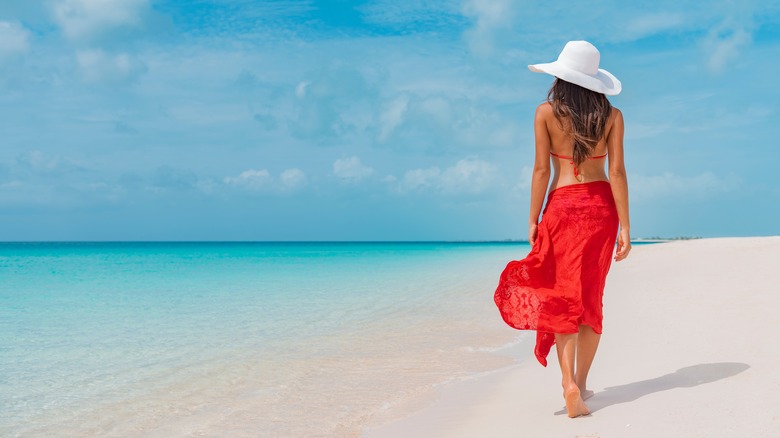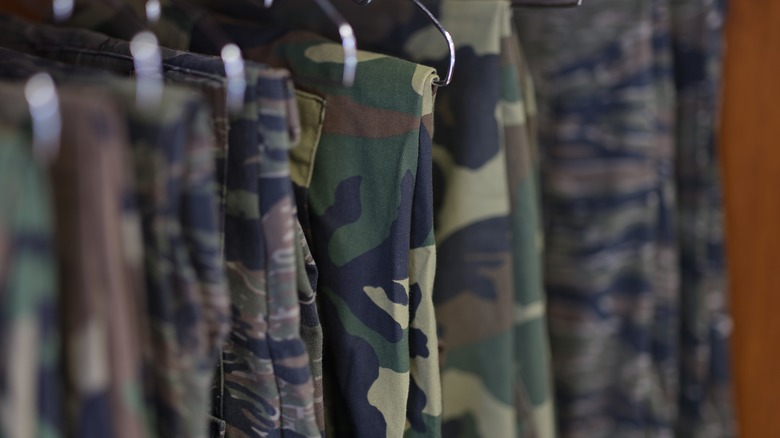Avoid Packing This Style Clothing When Traveling To The Caribbean Islands
A sprawling archipelago with azure waters, golden sands, and rich cultures, Caribbean destinations are on many a travel bucket list. And with more than 28 million visitors in 2022 flocking to the region — enchanted by the rhythms of reggae, calypso, and the intoxicating aroma of local cuisine — there's no doubt about the Caribbean's allure.
But tucked amidst this paradise are some unique laws. And for the unsuspecting traveler, what you choose to wear can have more implications than you imagine. So if you've packed your favorite camouflage shorts for that hike in Barbados or St. Lucia, think again. According to the Royal Barbados Police Force, wearing camouflage is actually a criminal offense.
Camouflage of any color — be it green, blue, black, or any other commonly-used shades — is strictly prohibited for both locals and visitors in Barbados, and this restriction applies not just to clothing but extends to all accessories, including belts, shoes, hats, and even socks. The reason? Local legislation mandates that camouflage is exclusively reserved for members of the Barbados Defence Force. Wearing it suggests an attempt to impersonate law enforcement — which is taken very seriously.
Breaking the law will cost you
The decision to ban camouflage for the general public in the Caribbean islands varies, although most laws have deep-rooted societal reasons. Born out of concerns for national security, these rules aim to prevent any misuse of military attire, as well as the possibility of confusing a civilian for a member of the country's military forces.
So, what's the deal if you're caught bringing camouflage into destinations like Barbados or Trinidad and Tobago? For one, you can expect to pay a fine of about $2000. For more serious offenders, there's also the possibility of a one-year jail sentence along with said fine. In addition to receiving a hefty blow to your wallet, you should also expect to say goodbye to any and all of your camouflage items. Local authorities will swiftly confiscate and dispose of these upon finding them. Oh, and it's not just adults — even children's clothing isn't exempt from this regulation.
Traveling smart is about doing your research
At the end of the day, respecting local customs, traditions, and laws is an integral part of traveling. You're a visitor in their country, after all, and coming from abroad doesn't give you the right to decide what's appropriate or not — especially not when it comes to local rules and regulations.
And while the camouflage law might stand out because of how innocuous it seems, there are plenty of other laws that travelers should be wary of before their trip. In Barbados, for example, topless sunbathing is illegal on all beaches. So are most forms of gambling outside of slot machines and horse racing. Similarly, in Grenada, it's actually illegal to wear your swimsuit outside of the island's beaches, and you could face a fine of up to $270 for doing so. In addition to this, St. Kitts, a small island in the Antilles, has gone as far as criminalizing cursing — yeah, you read that right. Even rapper 50 Cent had to pay a $1,100 fine when he let a few swear words slip during a concert.
Whatever the case, always remember that knowledge is power — especially when traveling somewhere new. So, before you embark on your next adventure, remember to look into the local customs, laws, and cultural norms. Not only will this help you have a hassle-free trip, but it'll also deepen your appreciation and understanding of the place and its people.


